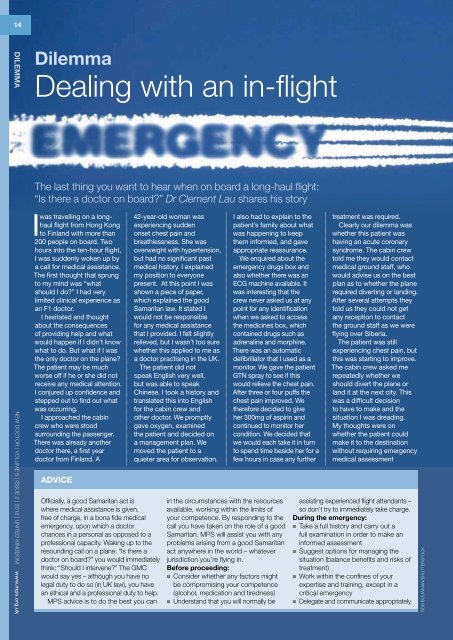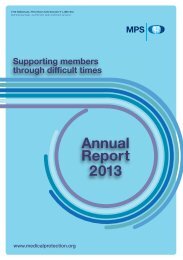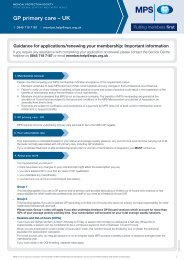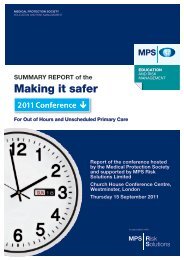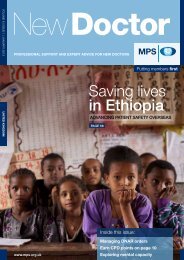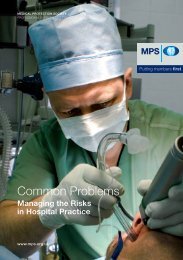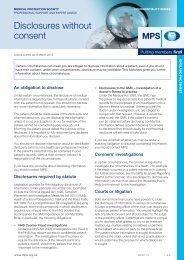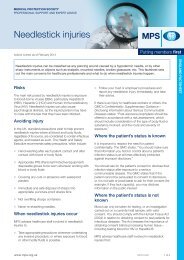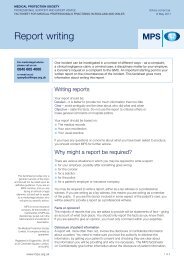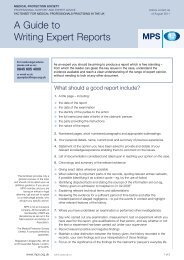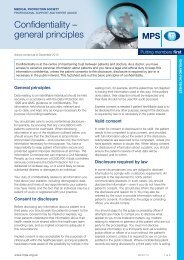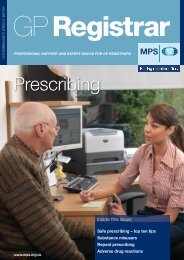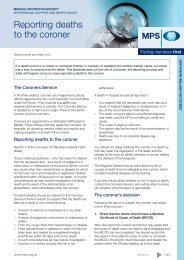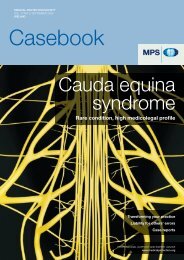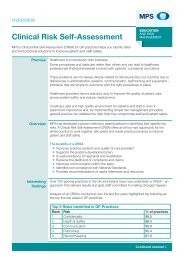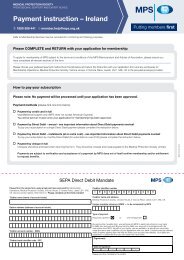New Doctor - Medical Protection Society
New Doctor - Medical Protection Society
New Doctor - Medical Protection Society
Create successful ePaper yourself
Turn your PDF publications into a flip-book with our unique Google optimized e-Paper software.
14<br />
DILEMMA<br />
NEW DOCTOR | VOLUME 5 | ISSUE 2 | 2012 | UNITED KINGDOM www.mps.org.uk<br />
Dilemma<br />
Dealing with an in-flight<br />
The last thing you want to hear when on board a long-haul flight:<br />
“Is there a doctor on board?” Dr Clement Lau shares his story<br />
I<br />
was travelling on a longhaul<br />
flight from Hong Kong<br />
to Finland with more than<br />
200 people on board. Two<br />
hours into the ten-hour flight,<br />
I was suddenly woken up by<br />
a call for medical assistance.<br />
The first thought that sprung<br />
to my mind was “what<br />
should I do?” I had very<br />
limited clinical experience as<br />
an F1 doctor.<br />
I hesitated and thought<br />
about the consequences<br />
of providing help and what<br />
would happen if I didn’t know<br />
what to do. But what if I was<br />
the only doctor on the plane?<br />
The patient may be much<br />
worse off if he or she did not<br />
receive any medical attention.<br />
I conjured up confidence and<br />
stepped out to find out what<br />
was occurring.<br />
I approached the cabin<br />
crew who were stood<br />
surrounding the passenger.<br />
There was already another<br />
doctor there, a first year<br />
doctor from Finland. A<br />
ADVICE<br />
Officially, a good Samaritan act is<br />
where medical assistance is given,<br />
free of charge, in a bona fide medical<br />
emergency, upon which a doctor<br />
chances in a personal as opposed to a<br />
professional capacity. Waking up to the<br />
resounding call on a plane: “Is there a<br />
doctor on board?” you would immediately<br />
think: “Should I intervene?” The GMC<br />
would say yes – although you have no<br />
legal duty to do so (in UK law), you have<br />
an ethical and a professional duty to help.<br />
MPS advice is to do the best you can<br />
42-year-old woman was<br />
experiencing sudden<br />
onset chest pain and<br />
breathlessness. She was<br />
overweight with hypertension,<br />
but had no significant past<br />
medical history. I explained<br />
my position to everyone<br />
present. At this point I was<br />
shown a piece of paper,<br />
which explained the good<br />
Samaritan law. It stated I<br />
would not be responsible<br />
for any medical assistance<br />
that I provided. I felt slightly<br />
relieved, but I wasn’t too sure<br />
whether this applied to me as<br />
a doctor practising in the UK.<br />
The patient did not<br />
speak English very well,<br />
but was able to speak<br />
Chinese. I took a history and<br />
translated this into English<br />
for the cabin crew and<br />
other doctor. We promptly<br />
gave oxygen, examined<br />
the patient and decided on<br />
a management plan. We<br />
moved the patient to a<br />
quieter area for observation.<br />
I also had to explain to the<br />
patient’s family about what<br />
was happening to keep<br />
them informed, and gave<br />
appropriate reassurance.<br />
We enquired about the<br />
emergency drugs box and<br />
also whether there was an<br />
ECG machine available. It<br />
was interesting that the<br />
crew never asked us at any<br />
point for any identification<br />
when we asked to access<br />
the medicines box, which<br />
contained drugs such as<br />
adrenaline and morphine.<br />
There was an automatic<br />
defibrillator that I used as a<br />
monitor. We gave the patient<br />
GTN spray to see if this<br />
would relieve the chest pain.<br />
After three or four puffs the<br />
chest pain improved. We<br />
therefore decided to give<br />
her 300mg of aspirin and<br />
continued to monitor her<br />
condition. We decided that<br />
we would each take it in turn<br />
to spend time beside her for a<br />
few hours in case any further<br />
in the circumstances with the resources<br />
available, working within the limits of<br />
your competence. By responding to the<br />
call you have taken on the role of a good<br />
Samaritan. MPS will assist you with any<br />
problems arising from a good Samaritan<br />
act anywhere in the world – whatever<br />
jurisdiction you’re flying in.<br />
Before proceeding:<br />
■ ■ Consider whether any factors might<br />
be compromising your competence<br />
(alcohol, medication and tiredness)<br />
■ ■ Understand that you will normally be<br />
treatment was required.<br />
Clearly our dilemma was<br />
whether this patient was<br />
having an acute coronary<br />
syndrome. The cabin crew<br />
told me they would contact<br />
medical ground staff, who<br />
would advise us on the best<br />
plan as to whether the plane<br />
required diverting or landing.<br />
After several attempts they<br />
told us they could not get<br />
any reception to contact<br />
the ground staff as we were<br />
flying over Siberia.<br />
The patient was still<br />
experiencing chest pain, but<br />
this was starting to improve.<br />
The cabin crew asked me<br />
repeatedly whether we<br />
should divert the plane or<br />
land it at the next city. This<br />
was a difficult decision<br />
to have to make and the<br />
situation I was dreading.<br />
My thoughts were on<br />
whether the patient could<br />
make it to the destination<br />
without requiring emergency<br />
medical assessment<br />
assisting experienced flight attendants –<br />
so don’t try to immediately take charge.<br />
During the emergency:<br />
■ ■ Take a full history and carry out a<br />
full examination in order to make an<br />
informed assessment<br />
■ ■ Suggest options for managing the<br />
situation (balance benefits and risks of<br />
treatment)<br />
■ ■ Work within the confines of your<br />
expertise and training, except in a<br />
critical emergency<br />
■ ■ Delegate and communicate appropriately.<br />
ROB BOUWMAN/SHUTTERSTOCK


